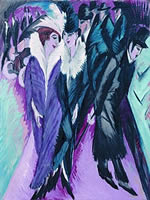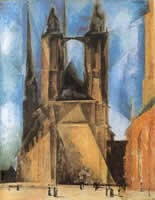download Syllabus as .doc-file
German 276: German Literature and Culture from 1900-1933
Tier Two General Education Course
COURSE DESCRIPTION
This course explores German literary, artistic and political developments during the last 18 years of the Kaiserreich (1871-1918) and the Weimar Republic (1918-1933). This chaotic period in German history was characterized not only by political, economic and existential uncertainty, but also by a proliferation of intellectual, cultural, artistic, and technological experimentation and innovation.
GOALS
To read outstanding works of German literature in their cultural and historical context, and to deepen your knowledge of intellectual, artistic, social and political developments in Germany during this period.
REQUIREMENTS
-- Class Preparation and Participation : Regular attendance is required, and more than 3 absences may result in your being dropped from this class . You are expected to complete all the assigned readings by the due date and come to class prepared to discuss them.
-- Oral Presentation : Each student will give an oral presentation and lead a class discussion on one of the texts that the class has read. These may be presented either individually or with a partner. When you sign up for your presentation/discussion, write down the date on your syllabus. You should focus on the text, and you may also include background information about the author and contemporary events in Germany.
-- Midterm Exam and occasional quizzes on the readings
-- 3 essays (typed, double-spaced): The first two essays should be 4-5 pages long and the final essay should be 6-8 pages long. If you cite someone else's work in your essay you must give a reference [author, title, date and place of publication, page number(s)]. If you cite a work on the Internet, give the complete URL as well as the author of the work. Verbatim Citations must be in quotation marks. Read the statement on plagiarism at the end of this syllabus.
TEXTS
Thomas Mann |
Death in Venice and other Tales. Translated by J. Neugroschel. |
Classnotes, Part 1 |
German Expressionist Plays |
Classnotes, Part 2 |
German Expressionist Poetry |
Franz Kafka |
The Metamorphosis, In the Penal Colony and other Stories. Translated by J. Neugroschel |
Brecht |
The Rise and Fall of the City of Mahagonny; The Seven Deadly Sins of the Petty Bourgeoisie |
Bertolt Brecht |
The Good Person of Szechwan; Mother Courage and her Children; Fear and Misery of the Third Reich |
Bertolt Brecht |
The Three-Penny Opera |
Bertolt Brecht |
Galileo |
Lawrence Senelick |
Cabaret Performance . Vol. 2 |
Hans Peter Richter |
Friedrich |
Ernst Ludwig Kirchner: |
Lionel Feininger: Marienkirche |
Franz Marc: Die großen blauen Pferde |
Ernst Toller und Walter Hasenclever |
Georg Kaiser |
Bertolt Brecht |
Erich Kästner |
SYLLABUS
Date |
Topic |
Assignment |
First Week: |
Introduction |
|
Second Week: |
Thomas Mann: Death in Venice |
Read and be prepared to discuss Death in Venice |
Third Week: |
Thomas Mann: Tonio Kroeger, |
Presentations: 1) _______________________ |
Fourth Week: |
German Expressionist Plays (Classnotes, Part 1): Hasenclever: The Son |
Presentations: 1)________________________ |
Fifth Week: |
German Expressionist Plays: Kaiser: From Morning to Midnight |
Presentations: 1) ________________________ |
Sixth Week: |
German Poetry (Classnotes, Pt. 2): Trakl (65-73, 79-81), von Hoddis, Schwitters, Heym |
Presentations: 1)_________________________ Presentations:2)__________________________ 2/16: First Essay Due (4-5 pages, typewritten, double-spaced) |
Seventh Week: |
German Poetry: Werfel, Brecht, Kaestner |
Presentatons: 1) _________________________ |
Eighth Week: |
Franz Kafka: The Metamorphosis |
Presentations: 1)_________________________ |
Ninth Week: |
Franz Kafka: The Judgment, The Stoker, Before the Law, A Report for an Academy |
3/9: Midterm Exam |
Tenth Week 3/11-19 |
SPRING BREAK |
|
Eleventh Week: |
Bertolt Brecht/Kurt Weill: Rise and Fall of the City of Mahagonny |
Presentations 1)__________________________ Video: Aufstieg und Fall der Stadt Mahagonny (English subtitles) |
Twelfth Week: 3/28, 30 |
Bertolt Brecht/Kurt Weill: The Three-Penny Opera |
Presentations 1) _________________________ Video: Die Dreigroschenoper (English subtitles) 3/30: Second Essay Due (4-5 pages) |
Thirteenth Week 4/4, 6 |
Brecht: Mother Courage, Galileo |
Presentations 1) _________________________ |
Fourteenth Week: 4//11, 13 |
Senelick: Cabaret Performance, Vol. 2 (Performances in class) |
Presentations: 1)_________________________ |
Fifteenth Week: |
Senelick: Cabaret Performance, Vol. 2 (Performances in class) |
Presentations: 1)_________________________ |
Sixteenth Week: |
Hans Peter Richter: Friedrich |
Presentations: 1) _________________________ 2) _________________________ |
Seventeenth Week: |
Hans Peter Richter: Friedrich |
5/2: Final Essay Due (6-8 pages) |
Semester Grade:
Class Preparation and Participation: 15%
Oral Presentation: 15%
Essay 1: 15%
Midterm: 20%
Essay 2: 15%
Final Essay: 20%
PLAGIARISM:
Integrity is expected of every student in all academic work. The guiding principle of academic integrity is that work submitted for a grade must be your own. Representing the words or ideas of another as your own in any academic exercise constitutes plagiarism. The following are examples of plagiarism:
- failing to cite quotations and borrowed ideas
- failing to enclose borrowed language in quotation marks
- failing to put summaries and paraphrases in your own words
- submitting all or part of academic work that you have previously submitted for a grade (for example in another class) without fair citation of your original work.
Before you write your first paper you should familiarize yourself with the Code of Academic Integrity in the University of Arizona on-line catalog:
- http://catalog.arizona.edu/policies/994/acacode.htm
- http://w3.arizona.edu/~studpubs/policies/cacaint.htm .
- http://www.gened.arizona.edu/eslweb/whatis.htm
Be sure to ask before you write your paper if you are unsure what constitutes plagiarism. Academic dishonesty can result in sanctions, including possible suspension or expulsion from the University of Arizona.
SPECIAL NEEDS:
Students with disabilities who require reasonable accommodations to fully participate in course activities or meet course requirements must register with the Disability Resource Center. ( http://drc.arizona.edu/ ). If you qualify for services through DRC, bring your letter of accommodations to me as soon as possible.
CELL PHONES, PAGERS, ETC:
If you bring these with you it is your responsibility to turn the ringer off before class. Failure to do so will result in loss of attendance credit, and you may be asked to leave class.






